|
|
|
Sort Order |
|
|
|
Items / Page
|
|
|
|
|
|
|
| Srl | Item |
| 1 |
ID:
088751
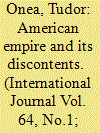

|
|
|
| 2 |
ID:
122832
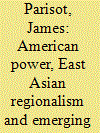

|
|
|
|
|
| Publication |
2013.
|
| Summary/Abstract |
Recent years have seen a revival of discussions on American decline. This paper intervenes in this debate by suggesting that there is a tendency towards partial conceptualisations of US power. It suggests a new historical materialist perspective that makes it possible to theorise American Empire as a relational social totality embedded within global capitalism. The paper then analyses the social limits of China's rise and the integration of East Asian regionalisation into American Empire, suggesting the extent to which world power has shifted east has tended to be overestimated. It also analyses the emergence of Brazil, India, and the brics meetings, suggesting these developments have a limited, but overstated, capacity to challenge American Empire.
|
|
|
|
|
|
|
|
|
|
|
|
|
|
|
|
| 3 |
ID:
130240
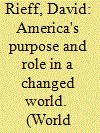

|
|
|
|
|
| Publication |
2014.
|
| Summary/Abstract |
Let me begin by putting my own moral and ideological cards on the table, since I assume that I have been asked to participate in this symposium because of, and not in spite of, the fact that I reject the idea that America's global hegemony is not just good for the United States but assures global peace and stability as well, and thus is good for the world. In his recent book-length article for a special issue of the New Left Review titled "American Foreign Policy and Its Thinkers," a brilliant, implacable anatomization of the American Empire, Perry Anderson approvingly quotes Christopher Layne's observation that "in international relations, benevolent hegemons are like unicorns-there is no such animal." That is certainly my view. And I would add that a democratic empire (for other than its own citizens, at least) is quite simply a contradiction in terms.
|
|
|
|
|
|
|
|
|
|
|
|
|
|
|
|
| 4 |
ID:
090676
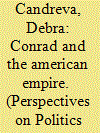

|
|
|
|
|
| Publication |
2009.
|
| Summary/Abstract |
Joseph Conrad offers some of the most notoriously contested writing on imperialism in nineteenth-century literature. In this article, I use two of his stories ("An Outpost of Progress" and Heart of Darkness) to argue that his critique of imperialism is as relevant today as it was in his own time.
Conrad's critique of imperialism is twofold. First and most simply, he condemns it as an economically exploitative endeavor. Second, and more importantly, he rejects the "idealistic" claim often invoked to justify imperialism as the bearer of progress, enlightenment, and other supposedly universal liberal values. This second critique causes Conrad the most difficulty, largely because his rejection of idealism is only partial. I argue that the most controversial aspects of his work are manifestations of a philosophical struggle between universalistic idealism on the one hand, and relativistic skepticism on the other. In this, Conrad contends with a problem that historically has challenged both liberalism and its conservative critics alike. Moreover, it continues to challenge both perspectives today, particularly in the debate over so-called American imperialism.
|
|
|
|
|
|
|
|
|
|
|
|
|
|
|
|
| 5 |
ID:
085136
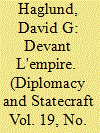

|
|
|
|
|
| Publication |
2008.
|
| Summary/Abstract |
Many observers of contemporary French politics would find it difficult to resist the temptation to conclude that France, alone among the European allies of the United States, has consistently had the greatest difficulty in adjusting to the reality of America's power. When that power occasions, as it frequently does, debates about "American empire," French opposition to American influence seems to become even more pronounced. In fact, there has in recent decades been a distinctive French negative assessment of the merits of American empire, but it would be a mistake, or so this paper argues, to assume that French interests have invariably been at odds either with American power or with American empire. Using four eponymous figures to illustrate the French perspective on American empire in the past 100 years, this essay highlights how and why that assessment has evolved.
|
|
|
|
|
|
|
|
|
|
|
|
|
|
|
|
| 6 |
ID:
181602
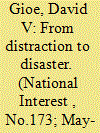

|
|
|
|
|
| Summary/Abstract |
America’s strategic distraction has favored addressing foreign threats and those domestically with a foreign aspect, leaving a wide space for domestic extremism to go unchecked.
|
|
|
|
|
|
|
|
|
|
|
|
|
|
|
|
| 7 |
ID:
138315
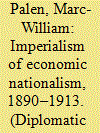

|
|
|
|
|
| Summary/Abstract |
Debunking the common laissez-faire myth surrounding turn-of-the-century American foreign relations allows for a reconceptualization of American imperialism from 1890 to 1913. The Republican Party, the party of protectionism, found itself riven by internal disagreements over the future of the protectionist system and U.S. imperial expansion. From within Republican protectionist ranks arose a progressive wing that increasingly looked beyond the home market for the country’s growing American agricultural and manufacturing surpluses. They did so against staunch anti-imperial opposition not only from American free-trade independents, but also from the Republican Party’s isolationist home-market protectionists, who yet feared or disdained foreign markets and colonial acquisitions. These progressive Republican proponents of empire combined coercive trade reciprocity with protectionism—an expansive closed door—and worked hard to extend American imperial power through informal means of high tariff walls, closed U.S.-controlled markets, and retaliatory reciprocity if possible, by formal annexation and military interventionism when necessary. The American Empire thus arose owing to the imperialism of economic nationalism, not the imperialism of free trade.
|
|
|
|
|
|
|
|
|
|
|
|
|
|
|
|
| 8 |
ID:
137745


|
|
|
|
|
| Summary/Abstract |
The fourth volume of Michael Mann’s The Sources of Social Power is the last in his historical sociological series, which has centred on an analysis of ideological, economic, military and political power in human societies from the start of civilisation. Mann’s final volume provides an important overview of the period of American hegemony and its worldwide effects, the rise and crisis of neoliberalism, the contrasting fates of the USSR and Maoist China, the vagaries of American empire, and modern revolutions. The implications of his study, particularly regarding the history and theory of revolutions, are of the utmost value to anyone on the Revolutionary Left today, especially in the Third World. While Mann’s study is primarily focused on the West, it provides important lessons to be drawn for the Third World.
|
|
|
|
|
|
|
|
|
|
|
|
|
|
|
|
| 9 |
ID:
167089
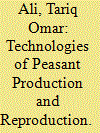

|
|
|
|
|
| Summary/Abstract |
In December 1959, the newly-constituted Pakistan Academy of Rural Development received permission to create a ‘laboratory’, that is, to conduct experiments in rural development upon peasants in Comilla, East Pakistan. This paper explores the enmeshing of post-colonial state formation and Cold War American development practices through an examination of how the Academy’s built environments, everyday practices and discourses were shaped by agricultural and contraceptive technologies. It examines how the Academy transformed a Gandhian ashram into a display and distribution centre for these technologies, and how technologies informed the Academy’s discourses on peasant religiosity and shaped peasant understandings of state and empire.
|
|
|
|
|
|
|
|
|
|
|
|
|
|
|
|
| 10 |
ID:
105359
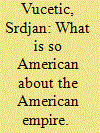

|
|
|
|
|
| Publication |
2011.
|
| Summary/Abstract |
This article argues that the American empire cannot be fully understood without reference to the ways in which American imperial identities have been associated with the historical experience of England/Britain. To make this argument, the article considers four discourses of identity in particular - Anglo-Protestantism (religion), Anglo-Saxonism (ethnicity/race), Anglo-Saxon capitalism (institutions) and English (language). US imperial development was conditioned by many forces, but none match the aggregate power of America's 'Anglo-ness'. Although it is too early to assess the ways in which these discourses are negotiated, critiqued and reproduced in the 'age of Obama', the American empire is likely to continue to protect and project Anglo-ness vis-à-vis to the rest of the world.
|
|
|
|
|
|
|
|
|
|
|
|
|
|
|
|
|
|
|
|
|